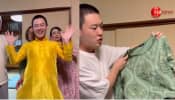Canberra: Billy Sing earned the nicknames "The Murderer" and "The Assassin" as a deadly sniper who shot more than 200 Ottoman troops during the Gallipoli campaign of World War I.
He was also part-Chinese and among thousands from non-European backgrounds, some of whom hid their identity, who joined the Australian Imperial Force to fight for their country despite being legally barred from signing up.
"He was a real Australian, an Australian at heart even though he had Chinese heritage," his great-nephew Don Smith, 62, told AFP from the small Queensland town of Clermont where Sing was born in 1886, 1,600 kilometres (1,000 miles) north of Sydney.
"He put his life on the line for the rest of us so that we can have the life we have today, (like) all the guys that went to war."
Under Australia`s 1909 Defence Act, "those who are not substantially of European origin or descent" were blocked from active service.
But some from minority backgrounds including indigenous Australians still stepped forward, trying multiple times despite being rejected.
Of the 416,809 Australians who enlisted in WWI, more than 1,000 were Aborigines while about 400 were estimated to be of Chinese descent. The Australian War Memorial has identified about 50 indigenous people who served in Gallipoli.
"You had to enlist without saying you were of indigenous background at all otherwise you might be turned away, and some were turned away," Robin Prior of Flinders University told AFP, adding that the majority of Australians at that time were of Anglo-Celtic heritage.
"It seems extraordinary now, but that was the law."
In 1917, with recruits harder to find, military orders were relaxed so only one parent needed to be of European origin.
The Australian Imperial Force`s Europe campaign began on April 25, 1915 when its soldiers landed at Gallipoli -- a peninsula in what is now Turkey -- together with troops from Britain, France and New Zealand.
It proved to be a disastrous eight-month battle. Of the 60,000 Anzac (Australian and New Zealand Army Corps) soldiers who fought, 11,500 died.William Edward Sing, who also fought on the Western Front, was born to Chinese father John Sing and English mother Mary Ann Pugh.
Growing up in rural Queensland, Sing was a skilled horse rider, kangaroo hunter and shooter. By the time he enlisted in October 1914 aged 28, he was renowned locally for his shooting prowess.
Such skills, as well as his early enlistment, may have helped him avoid some of the resistance faced by other non-European men, researchers believe.
Sing arrived in Gallipoli in May 1915 with the 5th Light Horse Regiment. His sometimes "spotter" Ion Idriess wrote of his comrade in his memoir `The Desert Column`:
"He is a little chap, very dark, with a jet-black moustache and a goatee beard. A picturesque-looking man-killer. He is a crack sniper of the Anzacs."
Sing was awarded the Distinguished Conduct Medal, an honour second only to the Victoria Cross, in 1916. A military despatch said Trooper 355 killed 201 Turkish troops including his Ottoman counterpart "Abdul the Terrible".
But the illnesses and wounds Sing sustained took their toll and he was in and out of hospital.
Recovering from a gunshot wound in England in 1917, he married 21-year-old Scottish waitress Elizabeth Stewart before returning to the Western Front.
For his service at the September 1917 battle of Polygon Wood, he was awarded the Belgian Croix de Guerre.
Sing was discharged in Australia in November 1918, with a medical report saying he had been gassed in Belgium. His wife was not believed to have returned to Australia with him.
The war veteran was given land under a "soldier settlement" scheme but failed as a farmer and turned to gold prospecting. He eventually moved to Brisbane and died alone in 1943, aged 57, in a boarding house almost penniless.
While Sing was buried at Brisbane`s Lutwyche War Cemetery, Smith said it was only in the 1980s that he and three others pooled money to erect a headstone on his grave.Men like Sing signed up because they were driven by a strong sense of patriotism, said Kathie Blunt of the Chinese Heritage Association of Australia.
They were also generally treated the same as their peers, with privates paid six shillings a day with one shilling held back until discharge.
"It was a lot of money because most of these Chinese-Australians came from very low socio-economic backgrounds, so it... was a big deal," Blunt told AFP.
But for indigenous soldiers, the comradeship they experienced during the war reverted back to the same discrimination they faced before leaving Australia.
They were denied access to the settlement scheme -- with only one soldier known to have been given land, and received no official recognition until 2007.
In recent years, more Aboriginal and other troops from multicultural backgrounds have been acknowledged for their sacrifices.
As Australia marks a century since the start of the Gallipoli campaign, Prior said it was important to remember their contributions.
"I think we should be quite amazed that they would be prepared to fight for a country that really discriminated against them," she said.
















